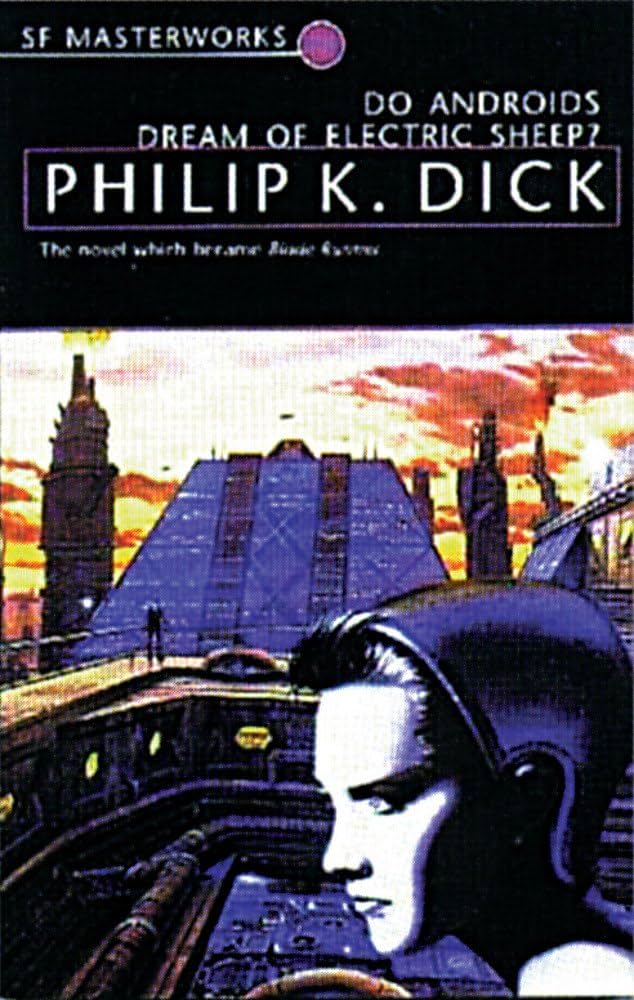Author: Philip K. Dick
Publisher / Year: Doubleday, 1968
Genre/Subgenre: Science Fiction / Dystopian, Psychological Speculative Fiction
Page Count: ~210
Table of Contents
A Dystopian Dreamscape
Philip K. Dick’s Do Androids Dream of Electric Sheep? is not merely the literary foundation for the cult film Blade Runner—it is a philosophically rich, unsettling portrait of a post-apocalyptic society where the boundaries between real and artificial life are increasingly blurred. The novel presents a world ravaged by nuclear war, ecological collapse, and spiritual decay. But amid the ashes, Dick constructs a haunting inquiry into empathy, identity, and the very nature of what it means to be human.
Set in 2021 (a future already behind us, yet still strangely ahead), the narrative follows Rick Deckard, a bounty hunter tasked with “retiring” rogue androids—replicants so advanced that distinguishing them from humans requires invasive testing. Yet what begins as a mission of moral clarity soon crumbles into philosophical disarray.
Empathy as the Final Frontier
The cornerstone of Dick’s dystopia is a concept both ancient and urgent: empathy. In this bleak future, animals are nearly extinct, and artificial pets are common. Empathy has become both a commodity and a moral compass—something to be measured, purchased, even faked.
Deckard uses the Voigt-Kampff test to expose androids, evaluating their empathic responses to hypothetical distress scenarios. Yet this system itself is suspect. Androids like Rachael Rosen and Luba Luft react in disturbingly human ways, while some humans show startling indifference. In turning empathy into a test, Dick invites us to ask whether it’s truly innate—or if it can be simulated like everything else.
The central irony is potent: the very tool used to distinguish humans from machines may expose how mechanical humans themselves have become. In this reversal, Dick subtly warns against the erosion of authentic feeling in a technocratic society.
Androids, Identity, and Emotional Imitation
The androids in the novel are not robotic in the traditional sense—they are near-perfect imitations of humans, indistinguishable in body and voice. Their defect lies not in cognition or behavior, but in what they lack: genuine emotional resonance.
Yet Dick complicates this. Characters like Rachael and Roy Baty exhibit moments of vulnerability, ambition, and pain. Rachael seduces Deckard in a disturbingly intimate ploy, but her tears—programmed or not—leave a real imprint. When Deckard ultimately questions whether androids can love, or if he himself deserves to feel, the binary crumbles.
These questions strike at the core of personhood. Can a being that desires to live and fears death truly be considered “other”? Or is our revulsion merely a defense mechanism to preserve the illusion of moral superiority?
The Electric Sheep: Status and Simulacrum
The book’s title is more than metaphor—it’s literal. Deckard owns an electric sheep, a synthetic animal designed to replace real livestock, now symbols of status and virtue. Caring for a real animal is not just a personal joy; it’s a societal expectation, a sign of one’s ethical worth.
But Deckard’s sheep is a lie, a substitute he can barely maintain. This motif reflects the wider theme of simulacra—the copy without original. As artificial animals and androids become indistinguishable from the real, the world succumbs to a kind of existential vertigo. If everything can be faked, then what is real?
In this way, the electric sheep mirrors Deckard’s own internal struggle. Just as he questions whether his feelings for Rachael are real, the sheep reminds him (and us) that meaning is often derived not from the object itself, but from the belief it inspires.
Mercerism and the Illusion of Unity
Dick weaves a quasi-religious thread through the novel in the form of Mercerism, a faith centered around collective suffering. Through an “empathy box,” users merge with Wilbur Mercer, a Christ-like figure climbing an endless hill while enduring stones thrown by unseen enemies. This ritual unites people in pain and redemption, offering solace in a fragmented world.
Yet even this spiritual touchpoint is revealed to be a hoax—Mercer is a fabricated actor. The revelation, however, doesn’t destroy the faith. As Deckard notes, the experience of empathy is real, even if its origin is false.
Here Dick plays his deepest card: the truth of an idea may not depend on its factual accuracy but on the resonance it awakens. Mercerism, like the sheep, becomes a vessel for belief in an unbelieving age.
The Blade Runner Divide
While Blade Runner (1982) borrows much from the novel, the two diverge sharply in tone. Ridley Scott’s adaptation leans into noir aesthetics, cyberpunk visuals, and a brooding meditation on memory. Dick’s novel is more chaotic, more spiritually fraught. Where the film asks what it means to be human, the book asks whether humanity itself is a sustainable illusion.
For those who know the movie but not the novel, reading Electric Sheep is like stepping behind the curtain. You find not a sleek dystopia but a dirty, decaying civilization where people cling to purpose amid entropy. It is more raw, more unnerving—and ultimately more rewarding.
TL;DR
Do Androids Dream of Electric Sheep? is not a comfortable read. It is disorienting, fragmented, and deeply philosophical. But therein lies its power. Dick’s genius is not in creating worlds but in dismantling the scaffolding of ours. He reveals how thin the line is between man and machine, soul and code, compassion and command.
This novel remains stunningly relevant in a world now filled with artificial intelligence, virtual reality, and emotional algorithms. As we program empathy into our machines, we must ask: Are we upgrading the machines—or downgrading ourselves?
Key Takeaways
- Empathy is the novel’s emotional and moral axis—uncertain, elusive, yet essential.
- Androids challenge our assumptions about personhood, rights, and emotional authenticity.
- Simulacra, from electric sheep to religious icons, expose society’s dependence on illusion.
- Deckard, the protagonist, undergoes a reverse dehumanization—shedding certainty to gain conscience.
- Dick’s vision forces readers to confront a question no machine can answer: “What makes you real?”

Leave a Reply